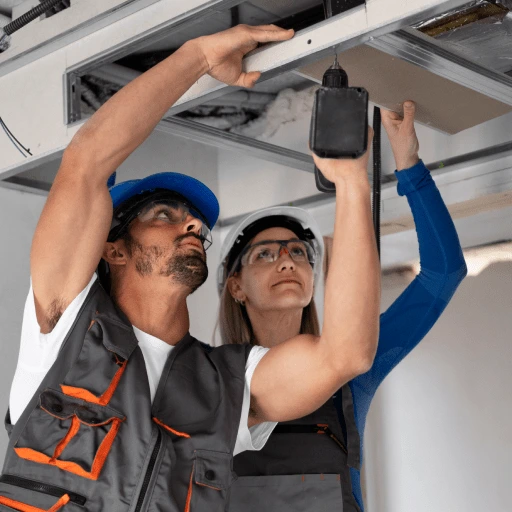
In Florida’s hot and humid climate, a functioning air conditioner is crucial for comfort and safety. But what do you do when your AC suddenly stops working? Handling an AC emergency efficiently can make all the difference. Here are some quick repair tips to help you manage an AC breakdown until professional help arrives.
Check the Thermostat Settings
The first step in troubleshooting your AC is to ensure the thermostat is set correctly.
- Verify the Temperature Setting: Make sure the thermostat is set to “cool” and that the temperature is lower than the current room temperature.
- Replace Batteries: If your thermostat is battery-operated, dead batteries could be the culprit. Replace them and see if that resolves the issue.
- Check for Proper Mode: Some thermostats have a “fan” mode, which circulates air without cooling it. Ensure it’s set to “auto” or “cool” mode.
Inspect the Circuit Breaker
If your AC isn’t running at all, the problem might be electrical.
- Locate the Breaker Box: Find your home’s breaker box and check if the circuit breaker for the AC unit has tripped.
- Reset the Breaker: If the breaker has tripped, reset it by flipping it off and then back on. If it trips again immediately, there could be a more serious electrical issue that requires professional attention.
Check the Air Filter
A clogged air filter can cause your AC to stop working efficiently or even shut down completely.
- Inspect the Filter: Check the air filter in your AC unit. If it’s dirty or clogged, replace it with a new one.
- Maintain Regular Replacement: To avoid future emergencies, make it a habit to replace the air filter every 1-3 months, depending on your usage and the type of filter.
Clear Debris from the Outdoor Unit
The outdoor condenser unit can become obstructed by leaves, dirt, and other debris, leading to performance issues.
- Turn Off the Power: Before you inspect the outdoor unit, make sure to turn off the power to your AC system.
- Remove Debris: Clear away any leaves, grass, or dirt that may be blocking the airflow around the condenser.
- Clean the Fins: Use a soft brush to gently clean the fins of the unit. Be careful not to bend them.
Ensure Proper Airflow
Poor airflow can cause your AC to overheat and shut down.
- Check Vents: Ensure all air vents in your home are open and not blocked by furniture or drapes.
- Inspect Ductwork: If you can access your ductwork, check for any visible obstructions or disconnected sections.
Defrost the Evaporator Coils
If your AC is running but not cooling, frozen evaporator coils could be the issue.
- Turn Off the AC: Switch off the AC and allow the coils to thaw. This could take several hours, but it may resolve the problem temporarily.
- Check the Filter and Fan: Once thawed, make sure the air filter is clean and the fan is working properly. A clean filter and good airflow can prevent the coils from freezing again.
When to Call a Professional
While these tips can help you manage an AC emergency, some issues require professional expertise. If your AC isn’t working after these troubleshooting steps, or if you notice unusual noises, leaks, or persistent performance issues, it’s time to call a certified HVAC technician.
Conclusion
Handling an AC emergency can be stressful, especially in Florida’s heat. By following these quick repair tips, you can address common issues and keep your home cool until a professional can provide a permanent fix. Regular maintenance and timely inspections can also prevent future emergencies. For expert AC repair services or to schedule a maintenance check, contact a trusted HVAC company today and ensure your home stays comfortable all year round.